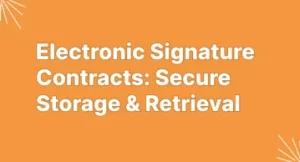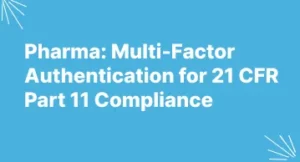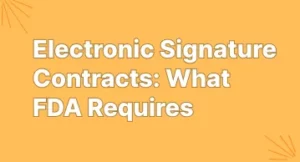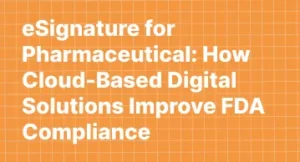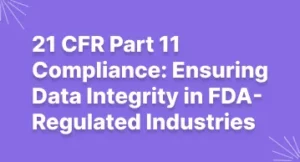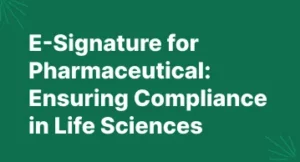21 CFR Part 11 Compliance: Key Requirements & Principles
Introduction
In highly regulated industries like pharmaceuticals and life sciences, ensuring the security, integrity, and authenticity of electronic records and signatures is absolutely critical. FDA 21 CFR Part 11 establishes the standard for managing electronic documents, ensuring they carry the same trust and legal weight as traditional paper records. Non-compliance can result in severe consequences, including substantial fines, legal liability, and reputational harm.
But what exactly does 21 CFR Part 11 compliance entail, and why is it so essential for pharmaceutical companies? More importantly, how can businesses seamlessly integrate these requirements into their digital workflows without disrupting productivity?
In this blog, we’ll break down the key principles and requirements of 21 CFR Part 11, and show how MSB Docs helps organizations streamline compliance with ease and confidence.
What is FDA 21 CFR Part 11?
Definition and Purpose
Introduced in 1997, 21 CFR Part 11 is a regulation by the U.S. FDA (Food and Drug Administration) that governs electronic records and electronic signatures (ERES). It outlines how these records must be created, modified, maintained, archived, retrieved, and transmitted to ensure they are trustworthy, reliable, and equivalent to paper records and handwritten signatures.
21 CFR Part 11 applies to industries regulated by the FDA, including pharmaceuticals, biotechnology, clinical research organizations (CROs), and medical device manufacturers. The regulation ensures that electronic records and digital signatures are just as reliable, authentic, and legally binding as traditional paper records and handwritten signatures.
Why Compliance Matters
For pharmaceutical companies, 21 CFR Part 11 compliance isn’t optional—it’s essential. This regulation is designed to protect against data tampering, unauthorized access, and security breaches, ensuring that electronic records and signatures are trustworthy and secure.
Compliance also brings operational benefits. It streamlines document management, reduces reliance on paper, improves traceability, and strengthens overall data integrity across systems and workflows.
Non-compliance carries serious risks including legal penalties, product recalls, and even the loss of market access. In such a high-stakes industry, maintaining compliance isn’t just about ticking boxes—it’s about protecting your business, your reputation, and ultimately, patient safety.
Key Requirements of 21 CFR Part 11
To achieve 21 CFR Part 11 compliance, organizations must meet specific FDA-mandated requirements that ensure electronic records and digital signatures are secure, authentic, and legally valid.
Electronic Records Compliance
- 21 CFR Part 11 requires electronic records to be as trustworthy, reliable, and equivalent to paper records.
- Secure storage solutions must be in place to protect data integrity.
- All changes to records must be logged in a secure, computer-generated audit trail, capturing who made the change, what was changed, and when.
Electronic Signatures Compliance
- Each digital signature must be unique to the individual user and cannot be reused or reassigned.
- Signatures must be legally binding and permanently linked to the respective record.
- Audit Trails & Data Integrity
- Systems must maintain tamper-proof audit trails, logging all record modifications with accurate timestamps.
- Audit logs should be accessible only to authorized personnel.
Access Controls & Security
- Organizations must enforce role-based access controls to limit data access based on job responsibilities.
- Strong encryption and authentication protocols should be in place to protect sensitive data and prevent unauthorized access.
For pharmaceutical and life sciences organizations, these requirements ensure that essential data—such as clinical trial results, manufacturing records, and regulatory submissions —remains secure and uncompromised.
Core Principles of 21 CFR Part 11 Compliance
Beyond technical features, businesses must follow key principles to maintain long-term compliance with 21 CFR Part 11. These principles help ensure data integrity, system reliability, and regulatory readiness.
System Validation
To prove that their electronic record-keeping systems are reliable, companies must:
- Conduct thorough system testing and maintain detailed documentation.
- Perform risk assessments and implement appropriate mitigation strategies.
- Regularly revalidate systems, especially after updates.
User Authentication & Access Control
To prevent unauthorized access and ensure accountability, organizations should:
- Require unique user IDs and strong passwords for each individual.
- Use strong authentication methods; while multi-factor authentication (MFA) is not explicitly required, it is considered a best practice.
- Implement automatic session timeouts, password expiration policies, and account lockouts.
Secure & Traceable Audit Trails
A robust audit trail must:
- Record all relevant system activities, including record creation, edits, and deletions.
- Capture key details such as timestamps, user identification, and modification details.
- Be tamper-evident and protected from unauthorized access or alteration.
Linking Electronic Signatures to Records
- Each electronic signature must be permanently tied to its respective record.
- Signatures must clearly indicate the user’s identity, date/time of signing, and the reason for signing.
- Systems must ensure non-repudiation, meaning users cannot deny their signature or signing action.
Following these principles not only ensures 21 CFR Part 11 compliance, but also enhances data integrity, operational efficiency, and regulatory confidence within the pharmaceutical and life sciences industries.
Why 21 CFR Part 11 Compliance is Crucial for Pharma & Life Sciences
Ensuring Data Security in Pharmaceuticals
For pharmaceutical and life sciences organizations, 21 CFR Part 11 compliance is essential when managing critical operations, including:
- Clinical trials: Protecting patient data and ensuring the accuracy and reliability of trial records.
- Manufacturing processes: Maintaining precise electronic production and quality control records.
- Regulatory submissions: Ensuring that electronic documentation meets FDA standards for approvals.
The Risks of Non-Compliance
Companies that fail to meet 21 CFR Part 11 compliance requirements can face serious consequences, including:
- Significant fines and potential legal action.
- Losing FDA approval for new drugs,treatments, or devices.
- Reputational damage, eroding public and stakeholder trust.
The Benefits of Compliance
When done right, compliance brings substantial advantages:
- Increased operational efficiency: Reduces manual paperwork and minimizes errors.
- Enhanced data integrity and security: Protects sensitive information from breaches.
- Accelerated regulatory approvals: Streamlines FDA submission processes.
How MSB Docs Supports 21 CFR Part 11 Compliance
MSB Docs: A Trusted Compliance Solution
MSB Docs offers an FDA-compliant e-signature and document management solution tailored for pharmaceutical and life sciences companies. With MSB Docs, businesses can transition smoothly to electronic systems while staying fully aligned with 21 CFR Part 11 requirements.
Key Features That Ensure Compliance
- Out-of-box validation package: Reduces time and cost to adopt eSignature solution.
- Secure Digital Signatures: Legally binding, uniquely assigned, and fully traceable- designed to meet the rigorous standards of 21 CFR FDA compliance. Our solution ensures every necessary signature component is included, leaving no critical detail overlooked or forgotten.
- Tamper-Proof Audit Trails:Automatically capture and preserve every action—such as document edits, views, and approvals—with timestamps and user identification.
- Robust Authentication & Access Controls: Role-based access, secure login protocols, and best-practice authentication methods such as MFA help prevent unauthorized access to sensitive data.
- Automated Compliance Reporting: Simplifies audits and FDA inspections.
For a more detailed breakdown, check out our guide: 21 CFR Part 11 Compliance Guide.
Conclusion & Next Steps
For pharmaceutical and life sciences companies, achieving 21 CFR Part 11 compliance is non-negotiable. Not only does it ensure the security of electronic records, but it also helps businesses avoid costly penalties and operational disruptions.
With MSB Docs, organizations can streamline compliance processes effortlessly. Our platform offers secure digital signatures, strong authentication measures, and automated audit trails, making regulatory compliance easier than ever.
🚀 Ready to simplify compliance? Contact MSB Docs today and take the first step toward a secure and compliant digital workflow.
Key Takeaways
- 21 CFR Part 11 compliance ensures electronic records & signatures meet strict FDA standards.
- Compliance is critical for pharmaceutical and life sciences organizations handling regulated data.
- Non-compliance can result in serious consequences—fines, product recalls, and loss of market access.
- MSB Docs provides asecure, FDA-compliant solution tailored for regulated document workflows.
- Safeguard your business and streamline compliance by choosing MSB Docs!


